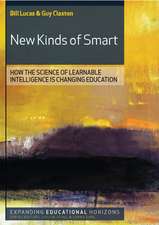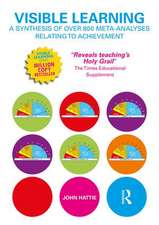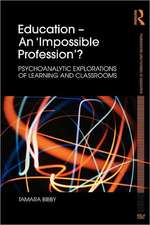Learning, Problem Solving, and Mindtools: Essays in Honor of David H. Jonassen
Editat de J. Michael Spector, Barbara B. Lockee, Sharon Smaldino, Mary Herringen Limba Engleză Paperback – 10 dec 2014
This collection of scholarly essays provides a highly engaging treatment of using tools and technologies to improve problem solving; multiple perspectives on integrating educational technology to support learning in complex and challenging problem solving domains; guidance for the design of instruction to support problem solving; a systemic account of the relationships between mental models, instructional models, and assessment models; and a look into the future of educational technology research and practice.
| Toate formatele și edițiile | Preț | Express |
|---|---|---|
| Paperback (1) | 482.19 lei 43-57 zile | |
| Taylor & Francis – 10 dec 2014 | 482.19 lei 43-57 zile | |
| Hardback (1) | 1066.09 lei 43-57 zile | |
| Taylor & Francis – 27 mar 2013 | 1066.09 lei 43-57 zile |
Preț: 482.19 lei
Nou
Puncte Express: 723
Preț estimativ în valută:
92.26€ • 96.59$ • 76.34£
92.26€ • 96.59$ • 76.34£
Carte tipărită la comandă
Livrare economică 07-21 aprilie
Preluare comenzi: 021 569.72.76
Specificații
ISBN-13: 9780415524360
ISBN-10: 0415524369
Pagini: 336
Dimensiuni: 152 x 229 x 23 mm
Greutate: 0.45 kg
Ediția:1
Editura: Taylor & Francis
Colecția Routledge
Locul publicării:Oxford, United Kingdom
ISBN-10: 0415524369
Pagini: 336
Dimensiuni: 152 x 229 x 23 mm
Greutate: 0.45 kg
Ediția:1
Editura: Taylor & Francis
Colecția Routledge
Locul publicării:Oxford, United Kingdom
Cuprins
Table of Contents
Dedication
Acknowledgements
Preface
Part 1 (J. M. Spector)
Chapter 1: Introducing mindtools and problem solving (J. M. Spector, B. B. Lockee, S. E. Smaldino, & M. C. Herring)
Chapter 2: Mental models and their role in learning by insight and creative problem solving (N. M. Seel, D. Ifenthaler, P. Pirnay-Dummer)
Chapter 3: A practice-centered approach to instructional design (B. Wilson)
Chapter 4: Experiential learning and cognitive tools: The impact of simulations on conceptual change in continuing healthcare education (T. Reeves)
Part 2 (Barbara B. Lockee)
Chapter 5: Simulations, games and virtual worlds as mindtools (S. J. Warren & J. S. Wakefield)
Chapter 6: Mindtools for teachers: Do you know the way to … Web 2.0? (P. A. Kirschner & I. G. J. H. Wopereis)
Chapter 7: Virtual gaming and leaving environments as "experience"-tools for learning through problem solving (J. M. Laffey, M. Schmidt, & K. Galyen)
Chapter 8: Comprehension using the strategic organization of text aided by a Web-based intelligent tutoring system: A text- and computer-based mindtool (K. Wijekumar & B. J. F. Meyer)
Chapter 9: Alternative pathways for research and instructional design on technology-supported group problem solving (S-C. Tan)
Part 3 (Sharon E. Smaldino)
Chapter 10: Reconsidering epistemology, learning and design (M. J. Hannafin)
Chapter 11: Conceptualizing problems in problem-based learning: Its role and cognitive tools (W. Hung)
Chapter 12: Problem solving for conceptual change (C. B. Lee & K. Murcia)
Chapter 13: Mobile technologies as mindtools for augmenting observations and reflection in everyday environments (S. M. Land, B. K. Smith, & H. T. Zimmerman)
Chapter 14: Mindtools for augmentation and their role in promoting ill-structured problem solving (B. Belland)
Part 4 (Mary C. Herring)
Chapter 15: A compendium of taxonomies (A. Tristan)
Chapter 16: Mindtools in online education: Enabling meaningful learning (R. Marra)
Chapter 17: First principles of learning (D. H. Jonassen)
Glossary
Index
Dedication
Acknowledgements
Preface
Part 1 (J. M. Spector)
Chapter 1: Introducing mindtools and problem solving (J. M. Spector, B. B. Lockee, S. E. Smaldino, & M. C. Herring)
Chapter 2: Mental models and their role in learning by insight and creative problem solving (N. M. Seel, D. Ifenthaler, P. Pirnay-Dummer)
Chapter 3: A practice-centered approach to instructional design (B. Wilson)
Chapter 4: Experiential learning and cognitive tools: The impact of simulations on conceptual change in continuing healthcare education (T. Reeves)
Part 2 (Barbara B. Lockee)
Chapter 5: Simulations, games and virtual worlds as mindtools (S. J. Warren & J. S. Wakefield)
Chapter 6: Mindtools for teachers: Do you know the way to … Web 2.0? (P. A. Kirschner & I. G. J. H. Wopereis)
Chapter 7: Virtual gaming and leaving environments as "experience"-tools for learning through problem solving (J. M. Laffey, M. Schmidt, & K. Galyen)
Chapter 8: Comprehension using the strategic organization of text aided by a Web-based intelligent tutoring system: A text- and computer-based mindtool (K. Wijekumar & B. J. F. Meyer)
Chapter 9: Alternative pathways for research and instructional design on technology-supported group problem solving (S-C. Tan)
Part 3 (Sharon E. Smaldino)
Chapter 10: Reconsidering epistemology, learning and design (M. J. Hannafin)
Chapter 11: Conceptualizing problems in problem-based learning: Its role and cognitive tools (W. Hung)
Chapter 12: Problem solving for conceptual change (C. B. Lee & K. Murcia)
Chapter 13: Mobile technologies as mindtools for augmenting observations and reflection in everyday environments (S. M. Land, B. K. Smith, & H. T. Zimmerman)
Chapter 14: Mindtools for augmentation and their role in promoting ill-structured problem solving (B. Belland)
Part 4 (Mary C. Herring)
Chapter 15: A compendium of taxonomies (A. Tristan)
Chapter 16: Mindtools in online education: Enabling meaningful learning (R. Marra)
Chapter 17: First principles of learning (D. H. Jonassen)
Glossary
Index
Notă biografică
J. Michael Spector is Professor and Chair of the Department of Learning Technologies at the University of North Texas, USA.
Barbara B. Lockee is Professor of Education and Associate Director of the School of Education at Virginia Polytechnic and State University, USA.
Sharon E. Smaldino is the L.D. and Ruth Morgridge Endowed Chair for Teacher Education at Northern Illinois University, USA.
Mary C. Herring is the Associate Dean of the College of Education at the University of Northern Iowa, USA.
All four co-editors of this volume are Past Presidents of the Association of Educational Communications and Technology (AECT; see http://www.aect.org), which has supported and facilitated this effort.
Barbara B. Lockee is Professor of Education and Associate Director of the School of Education at Virginia Polytechnic and State University, USA.
Sharon E. Smaldino is the L.D. and Ruth Morgridge Endowed Chair for Teacher Education at Northern Illinois University, USA.
Mary C. Herring is the Associate Dean of the College of Education at the University of Northern Iowa, USA.
All four co-editors of this volume are Past Presidents of the Association of Educational Communications and Technology (AECT; see http://www.aect.org), which has supported and facilitated this effort.
Descriere
Learning, Problem Solving, and Mindtools is inspired by the substantial body of learning research by David H. Jonassen in the areas of mind tools and problem solving. The focus of the volume is on educational technology, especially with regard to how new technologies have facilitated and supported problem solving and critical thinking.









